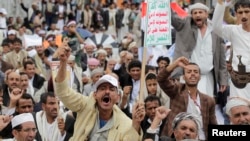The U.N. Security Council on Friday called on Yemen's Shi'ite Muslim Houthis to end hostilities against the government and warned foreign countries not to interfere by encouraging instability in the impoverished Arab state.
"The Security Council expresses grave concern about the deterioration of the security situation in Yemen in light of the action taken by the Houthis, led by Abdul Malik al Houthi, and those who support them, to undermine the political transition and the security of Yemen," the council said in a statement.
The Houthis, who have been fighting for years for more power for their Zaydi Shi'ite Muslim sect in north Yemen, have massed tens of thousands of supporters on the outskirts of the capital, Sanaa, to press the government to quit and to restore fuel subsidies. Some have set up encampments in Sanaa near the Interior Ministry.
"These actions include their escalating campaign to bring down the government; establishing camps in and around Sanaa; seeking to supplant the authority of the state by installing checkpoints on strategic routes into Sanaa, as well as ongoing fighting in al Jawf," the 15-member council added.
Talks on forming a new Yemeni government collapsed on Sunday over demands by Houthis to restore fuel subsidies cut by President Abd-Rabbu Mansour Hadi.
"The Security Council calls on the Houthis to withdraw their forces from Amran and return Amran to government of Yemen control; cease all armed hostilities against the government of Yemen in al Jawf, and remove the camps and dismantle the checkpoints they have erected in and around Sanaa," it said.
The council also said in the British-drafted statement that it "calls on all member states to refrain from external interference which seeks to foment conflict and instability and instead to support the political transition."
Yemen continues to resist demands by southern separatists for independence and is trying to quell the Houthi rebel movement, which has been on an offensive to extend its control over the country's north.
In March, Yemen's president called on Iran to stop supporting separatists in the south and religious groups in the north of the Arabian Peninsula country, which is trying to stabilize after more than two years of political upheaval.
Tehran has repeatedly denied interfering in Yemen.
An Iranian embassy official was kidnapped in the capital Sanaa earlier this year and another Iranian diplomat was fatally wounded when he resisted gunmen who attempted to abduct him.
The Security Council in February authorized U.N. sanctions against anyone who obstructs Yemen's political transition or commits human rights violations, but it stopped short of blacklisting any specific individuals.
Western diplomats in New York have said that former President Ali Abdullah Saleh and former Vice President Ali Salim Al-Beidh are top candidates for the U.N. blacklist.






